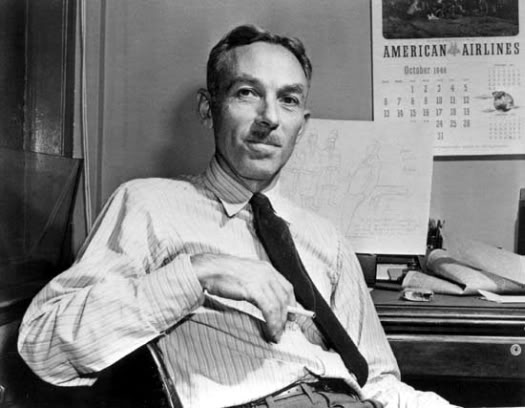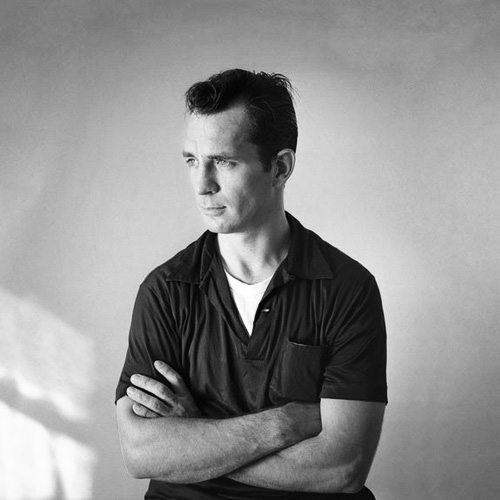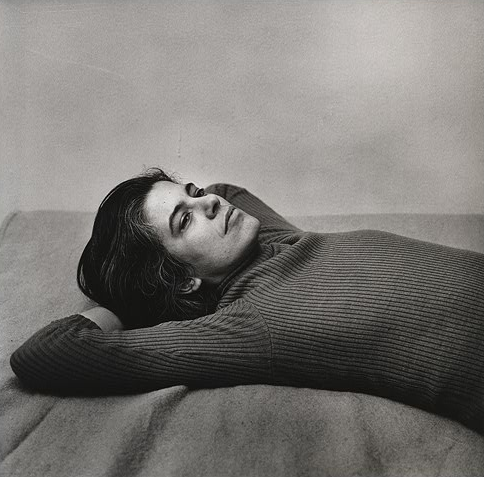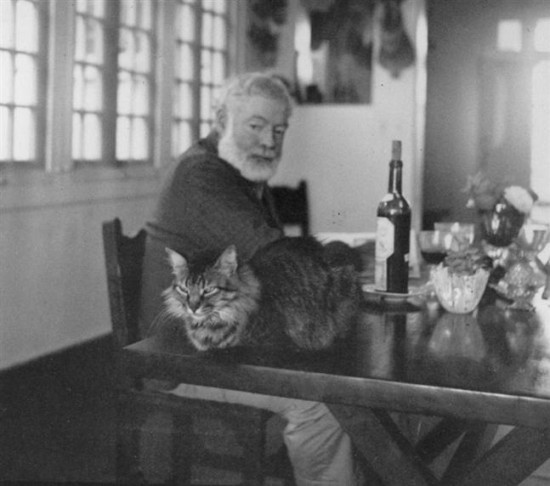When it comes to the art of writing, most writers will tell you they have a routine. Stephen King says that he writes 10 pages a day without fail, even on holidays. Truman Capote had to write lying down with a cigarette and coffee. Vladimir Nabokov wrote Lolita entirely on index cards. Victor Hugo wrote in the nude to ensure he wouldn’t leave the house (as a safety measure, he’d also instruct his valet to hide his clothes.)
I came across The Daily Routines of Famous Writers and found it was a treasure trove of secrets from notable authors on how they’ve perfected their craft. Who loves tricks of the trade? This girl.

Ray Bradbury – fantasy, science fiction, horror and mystery fiction writer
Ray Bradbury, one of the most celebrated 20th-century American writers, defies the question of routines in this 2010 interview:
My passions drive me to the typewriter every day of my life, and they have driven me there since I was twelve. So I never have to worry about schedules. Some new thing is always exploding in me, and it schedules me, I don’t schedule it. It says: Get to the typewriter right now and finish this.
He also has this to say about the proponent of working with joy:
I’ve never worked a day in my life. I’ve never worked a day in my life. The joy of writing has propelled me from day to day and year to year. I want you to envy me, my joy. Get out of here tonight and say: “Am I being joyful?” And if you’ve got a writer’s block, you can cure it this evening by stopping whatever you’re writing and doing something else. You picked the wrong subject.

Joan Didion – Novelist, Memoirist, Essayist
Joan Didion, one of my favorite authors of all time, creates for herself a kind of incubation period for ideas, articulated in this 1968 interview:
I need an hour alone before dinner, with a drink, to go over what I’ve done that day. I can’t do it late in the afternoon because I’m too close to it. Also, the drink helps. It removes me from the pages. So I spend this hour taking things out and putting other things in. Then I start the next day by redoing all of what I did the day before, following these evening notes. When I’m really working I don’t like to go out or have anybody to dinner, because then I lose the hour. If I don’t have the hour, and start the next day with just some bad pages and nowhere to go, I’m in low spirits. Another thing I need to do, when I’m near the end of the book, is sleep in the same room with it. That’s one reason I go home to Sacramento to finish things. Somehow the book doesn’t leave you when you’re asleep right next to it. In Sacramento nobody cares if I appear or not. I can just get up and start typing.

E.B. White – author of Charlotte’s Web & Stuart Little, among others
E.B. White, gives his thoughts on dealing with distractions while writing:
I never listen to music when I’m working. I haven’t that kind of attentiveness, and I wouldn’t like it at all. On the other hand, I’m able to work fairly well among ordinary distractions. My house has a living room that is at the core of everything that goes on: it is a passageway to the cellar, to the kitchen, to the closet where the phone lives. There’s a lot of traffic. But it’s a bright, cheerful room, and I often use it as a room to write in, despite the carnival that is going on all around me. A girl pushing a carpet sweeper under my typewriter table has never annoyed me particularly, nor has it taken my mind off my work, unless the girl was unusually pretty or unusually clumsy. My wife, thank God, has never been protective of me, as, I am told, the wives of some writers are. In consequence, the members of my household never pay the slightest attention to my being a writing man — they make all the noise and fuss they want to. If I get sick of it, I have places I can go. A writer who waits for ideal conditions under which to work will die without putting a word on paper.

Jack Kerouac – American novelist and poet
Jack Kerouac describes his rituals and superstitions in 1968:
I had a ritual once of lighting a candle and writing by its light and blowing it out when I was done for the night … also kneeling and praying before starting (I got that from a French movie about George Frideric Handel) … but now I simply hate to write. My superstition? I’m beginning to suspect the full moon. Also I’m hung up on the number nine though I’m told a Piscean like myself should stick to number seven; but I try to do nine touchdowns a day, that is, I stand on my head in the bathroom, on a slipper, and touch the floor nine times with my toe tips, while balanced. This is incidentally more than yoga, it’s an athletic feat, I mean imagine calling me ‘unbalanced’ after that. Frankly I do feel that my mind is going. So another ‘ritual’ as you call it, is to pray to Jesus to preserve my sanity and my energy so I can help my family: that being my paralyzed mother, and my wife, and the ever-present kitties. Okay?
He then adds a few thought on the best time and place for writing:
The desk in the room, near the bed, with a good light, midnight till dawn, a drink when you get tired, preferably at home, but if you have no home, make a home out of your hotel room or motel room or pad: peace.

Susan Sontag – writer and filmmaker, professor, literary icon, and political activist
Susan Sontag outlines her routine (and I must admit that it comes close to my own writing routine):
I write with a felt-tip pen, or sometimes a pencil, on yellow or white legal pads, that fetish of American writers. I like the slowness of writing by hand. Then I type it up and scrawl all over that. And keep on retyping it, each time making corrections both by hand and directly on the typewriter, until I don’t see how to make it any better. Up to five years ago, that was it. Since then there is a computer in my life. After the second or third draft it goes into the computer, so I don’t retype the whole manuscript anymore, but continue to revise by hand on a succession of hard-copy drafts from the computer.
I write in spurts. I write when I have to because the pressure builds up and I feel enough confidence that something has matured in my head and I can write it down. But once something is really under way, I don’t want to do anything else. I don’t go out, much of the time I forget to eat, I sleep very little. It’s a very undisciplined way of working and makes me not very prolific. But I’m too interested in many other things.

Henry Miller – American writer and painter
Henry Miller‘s commandments of writing:
MORNINGS:
If groggy, type notes and allocate, as stimulus.
If in fine fettle, write.
AFTERNOONS:
Work of section in hand, following plan of section scrupulously. No intrusions, no diversions. Write to finish one section at a time, for good and all.
EVENINGS:
See friends. Read in cafés.
Explore unfamiliar sections — on foot if wet, on bicycle if dry.
Write, if in mood, but only on Minor program.
Paint if empty or tired.
Make Notes. Make Charts, Plans. Make corrections of MS.
Note: Allow sufficient time during daylight to make an occasional visit to museums or an occasional sketch or an occasional bike ride. Sketch in cafés and trains and streets. Cut the movies! Library for references once a week.

Ernest Hemingway – author, journalist, Nobel Prize and Pulitzer Prize winner
Ernest Hemingway, who famously wrote standing up (“Hemingway stands when he writes. He stands in a pair of his oversized loafers on the worn skin of a lesser kudu—the typewriter and the reading board chest-high opposite him.”), approaches his craft with equal parts poeticism and pragmatism:
When I am working on a book or a story I write every morning as soon after first light as possible. There is no one to disturb you and it is cool or cold and you come to your work and warm as you write. You read what you have written and, as you always stop when you know what is going to happen next, you go on from there. You write until you come to a place where you still have your juice and know what will happen next and you stop and try to live through until the next day when you hit it again. You have started at six in the morning, say, and may go on until noon or be through before that. When you stop you are as empty, and at the same time never empty but filling, as when you have made love to someone you love. Nothing can hurt you, nothing can happen, nothing means anything until the next day when you do it again. It is the wait until the next day that is hard to get through.

Maya Angelou – author and poet
Maya Angelou shares her typical writing day in this 1990 interview:
I write in the morning and then go home about midday and take a shower, because writing, as you know, is very hard work, so you have to do a double ablution. Then I go out and shop — I’m a serious cook — and pretend to be normal. I play sane — Good morning! Fine, thank you. And you? And I go home. I prepare dinner for myself and if I have houseguests, I do the candles and the pretty music and all that. Then after all the dishes are moved away I read what I wrote that morning. And more often than not if I’ve done nine pages I may be able to save two and a half or three. That’s the cruelest time you know, to really admit that it doesn’t work. And to blue pencil it. When I finish maybe fifty pages and read them — fifty acceptable pages — it’s not too bad.
Think people should hear about this?